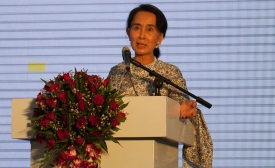soft power
Chef Outta Water presents a series of food events from Thursday, Sept. 28, to Sunday, Oct. 8, that are an exchange of flavors, friendship and business opportunities between Australia and Oregon. Australian Chef Michael Brine from Townsville, North Queensland, will be the ‘chef outta water’ teaming up with Astoria’s Chef Chris Holen as part of a local makers and food producers tour though Astoria, Portland, Hood River, Bend, and McMinnville. Brine will use his skill to pair ‘down under’ flavors with Oregon produce.
Sudanese officials are seeking to attract Chinese tourists, touting the impressive scenery and cultural heritage their country has to offer. At a tourism promotion event in Beijing on Wednesday, Sudanese officials also hailed a good relationship with China in making the case that Sudan could be an ideal destination for Chinese tourists. "We have unique tourist sites, ancient cultural heritage and beautiful natural scenery - that's Sudan's real treasure," Omer Eisa Ahmed, Sudanese Ambassador to China, told hundreds of potential tourists and Chinese travel agents at the event.
The first London Design Festival was launched in 2003. Since then, around 130 cities across the world have set up their own version. Why? Design is key to building a successful creative economy and a festival is a major gateway to individual creative industries.

Nafay Choudhury looks at the soft power behind the Nobel Peace Prize and its importance in the plight of Rohingya Muslims in Myanmar.
The Rohingya may be at the brink of facing genocide. Despite widespread international outcry, the pro-democracy Nobel Peace Prize Laureate Aung San Suu Kyi has remained deafeningly silent while the military continues its onslaught of the Rohingya. Worse yet, her title of Nobel Laureate serves to legitimize her continued (in)actions, while Rakhine State goes up in flames.
International students graduating in Japan could find it easier to launch their careers here if they fit into one of the categories spelled out in upcoming guidelines, which include jobs with a focus on international expansion in dining and apparel. The greater clarity on what types of workers would qualify for residency is meant to help domestic businesses hire more foreign-born talent straight out of Japanese schools. These individuals could also help promote tourism in Japan and support the Cool Japan soft-power initiative.
The Indian Council for Cultural Relations (ICCR) is organizing a three-day international jazz festival that will witness the convergence of French, Israeli, Korean, Mexican and Spanish artists in Delhi. [...] "ICCR believes that music can play a key role in engaging in creative dialogue with other nations. Festivals like these help us in understanding cultures of other countries and also gives opportunity to our own people to interact with world class performers," she said.







